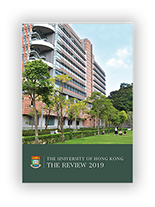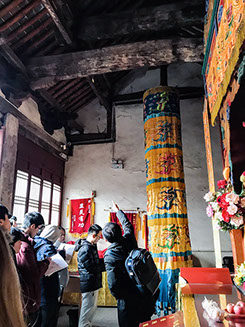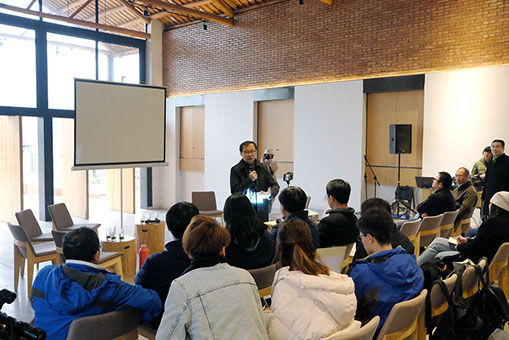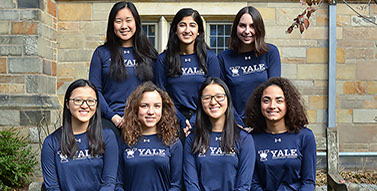Teaching and Learning
2018_%20.png?crc=3873734352)
PDF Version
Past Issues
Vision and Mission
An Extract from
the University’s
Annual Accounts 2018–19
The University Profile
Officers of the University
The Court
Teaching and Learning
Research and Innovation
Knowledge Exchange and
Technology Transfer
Message from the
President and
Vice-Chancellor
E-Book

First-hand Experience
Experiential learning continues to be an integral part of education at HKU, with opportunities to engage in discipline-based and service learning in Hong Kong, Mainland China and overseas.
Architecture as Object and Place
Field trips to historic and culturally noteworthy sites in Mzainland China are deepening Architecture students’ appreciation of both the architectural qualities of the structures they visit and the societies from which they emerged. In spring 2019, one group of students went to mountainous Jiyuan in Henan to study classical temple architecture, while another visited a rural area in Zhejiang to study vernacular dwellings, including a traditional family courtyard house.
Owen Miu Ho-yeung, a third-year student of Bachelor of Arts in Architectural Studies, travelled to Zhejiang to investigate traditional domestic architecture. “I initially thought we would see very rigid and conservative forms of architectural expression, but I came to realise that traditional Chinese buildings can be as flexible and adaptive as modern buildings,” he said. The family courtyard particularly impressed him. “We had to survey the complex and it gave me a thorough picture of what is meant by the term ‘Chinese architecture’. This field trip made me understand the beauty behind this sophisticated architecture and its cultural implications,” he said.
Classmate Johanna Li Yin went to Henan and produced surveys, maps and drawings of the temple and surrounding area. “We had the rare opportunity to go inside the altar of the temple, where usually only Taoists are allowed to enter to do rituals. We witnessed their everyday rituals and daily life. We also were able to talk to local people and get a better understanding of their living conditions,” she said.


Architecture students went to Henan to study classical temple architecture.
Professor Wang Weijen from the Faculty of Architecture giving a lecture to HKU students in a village in Zhejiang.
An Enriching Year
Starting from 2018–19, all third-year MBBS students embark on an ‘Enrichment Year’ in which they take charge of their learning by studying a non-medical subject, pursuing research, earning an extra degree, and / or undertaking service work. The first cohort returned refreshed and recharged, as the following examples illustrate.
Chan Wang-yeung went to impoverished Yongping county in Yunnan province to study the healthcare system and make recommendations to county officials. “This reminded me that public health is not only a matter of health but also involves multiple stakeholders and complex resource allocation,” he said. He also interviewed women there about perinatal depression. “The most impactful moment was when an interviewee told me about the failure of her first pregnancy. It made me realise that doctoring is not just about curing physical diseases but also helping heal patients’ mental wounds.”
Evelyn Chan Hui-yi went to Yale University as a visiting student where she studied anthropology, gender studies, global affairs and computer science, and volunteered with a healthcare outreach programme for the homeless and the student-run Yale Living History Project. “We listened to patients tell their life stories and wrote their narratives into their medical records. This helped us learn more about them as human beings instead of just patients,” she said.

Evelyn Chan Hui-yi (second from right in the first row) went to Yale University as a visiting student.
Caitlin Yeung Hon-ning had a busy year studying a full-time Master of Public Health programme at HKU; accompanying former Director-General of the World Health Organization (WHO) and Director of Health in Hong Kong, Dr Margaret Chan, to a conference in Bangkok; working as a part-time research assistant in the Department of Family Medicine and Primary Care on a project about the challenges faced by low-income families; and doing monthly home visits to chronically-ill elderly patients. “My varied experiences truly broadened my view on health in my community and beyond. I hope one day to combine my public health research skills with moral integrity to improve health in my community,” she said.
Four Countries in Four Weeks
Science students visited coastal areas in four countries over the summer to deepen their awareness of climate change and understand the interactions between different agents in tropical, sub-tropical and temperate coastal systems.
The experiential learning course, organised by Dr Thiyagarajan Vengatesen and Professor Gray Williams of the Swire Institute of Marine Sciences and the School of Biological Sciences, required students to spend a week in Hong Kong studying coastal ecology and sustainability, then a week in Penang to study tropical coastal ecology with the Centre for Marine and Coastal Studies of the Universiti Sains Malaysia. The students then spent more than two weeks in the Gulf of Maine, visiting coastal communities in the US and Canada in a programme organised with Northeastern University.
The students worked in groups focusing on one of four topics – food security, biodiversity and ecosystem services, coastal zone uses, or stakeholder engagement – and produced a report at the end comparing their observations from Asia and North America on that topic.
Trista Zhang Zheng, a third-year BSc student who was in the stakeholder engagement group, said the experience enabled her to see how biodiversity, policy, economics, landscape and other factors interacted. “I learned to stay humble as a decision-maker because we will never know enough about a system and we will never know better than the participants in this system. It is a simple thing to say we should engage with different stakeholders, but in reality the complexity is beyond expectation,” she said.
.jpg?crc=4002915724)
A mini mobile microscopic laboratory on board which enables students to examine the live organisms in their samples.
(Courtesy of Professor Brian Helmuth of Northeastern University)